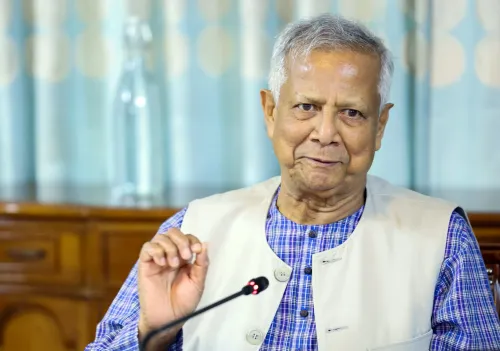What Led to the Resignation of Japanese PM Ishiba's Cabinet?

Synopsis
Key Takeaways
- Shigeru Ishiba and his cabinet have resigned as of October 21.
- Sanae Takaichi is the frontrunner to succeed Ishiba.
- The LDP has formed a coalition with the Japan Innovation Party.
- Takaichi’s government may struggle with legislative support.
- Her policy stance shows resistance to progressive reforms.
Tokyo, Oct 21 (NationPress) The resignation of Japanese Prime Minister Shigeru Ishiba and his cabinet on Tuesday signifies the conclusion of an administration that was in power for just over a year.
During a special cabinet meeting held shortly before 9 a.m. local time, ministers presented their resignation letters, leading to the formal departure of the Ishiba cabinet.
Later today, both chambers of the Diet are scheduled to gather to elect Japan's next prime minister.
Sanae Takaichi, the president of the ruling Liberal Democratic Party (LDP), is widely anticipated to secure the vote, bolstered by support from the Japan Innovation Party, which has recently formed a coalition with the LDP following Komeito's exit from their alliance.
Following the prime ministerial election, Takaichi will finalize her cabinet appointments, with the chief cabinet secretary expected to announce the new lineup.
Upon taking office, Takaichi is likely to hold a press conference to outline her policy direction and the reasoning behind her cabinet selections, as reported by Xinhua news agency.
On Friday, both Japan's ruling and opposition parties reached a consensus to elect a new prime minister to replace Shigeru Ishiba on October 21, as per local media.
The LDP, in power, and the main opposition party, the Constitutional Democratic Party of Japan, have agreed to conduct a parliamentary vote to select Ishiba's successor today, coinciding with the commencement of an extraordinary Diet session.
The LDP has established a tactical alliance with the Osaka-based right-wing Japan Innovation Party, also known as Ishin no Kai. This coalition is expected to facilitate Takaichi's election as prime minister later today, primarily due to the disjointed state of the opposition.
Despite this coalition, Takaichi's alliance lacks a clear majority in both parliamentary houses, indicating that her administration will require support from other opposition factions to pass legislation, raising concerns over its stability and durability.
Once elected, the 64-year-old Takaichi is anticipated to appoint a cabinet comprised of close allies of Taro Aso, a prominent figure within the LDP, alongside others who supported her during the party leadership election.
Takaichi has a reputation for opposing progressive reforms, particularly those related to gender equality. She has voiced opposition to same-sex marriage, supports male-only succession in the imperial family, and does not advocate for legal changes that would allow married couples to retain separate surnames.









